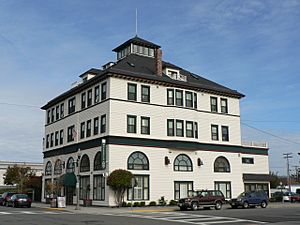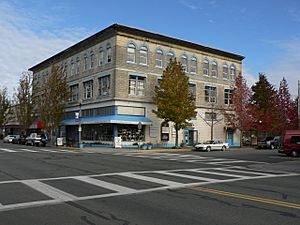Anacortes, Washington facts for kids
Quick facts for kids
Anacortes, Washington
|
||
|---|---|---|
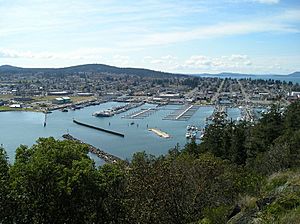
View of the downtown and marina of Anacortes from Cap Sante, c. 2006
|
||
|
||
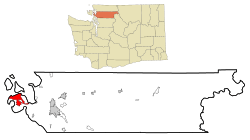 |
||
| Country | United States | |
| State | Washington | |
| County | Skagit | |
| Government | ||
| • Type | Mayor–council | |
| Area | ||
| • Total | 15.65 sq mi (40.53 km2) | |
| • Land | 11.70 sq mi (30.30 km2) | |
| • Water | 3.95 sq mi (10.23 km2) | |
| Elevation | 23 ft (7 m) | |
| Population
(2020)
|
||
| • Total | 17,637 | |
| • Estimate
(2021)
|
17,832 | |
| • Density | 1,498.16/sq mi (578.45/km2) | |
| Time zone | UTC-8 (PST) | |
| • Summer (DST) | UTC-7 (PDT) | |
| ZIP code |
98221
|
|
| Area code | 360 | |
| FIPS code | 53-01990 | |
| GNIS feature ID | 1511964 | |
Anacortes is a city in Skagit County, Washington, United States. The city's name comes from Anne Curtis Bowman. She was the wife of Amos Bowman, an early settler of Fidalgo Island.
In 2020, about 17,637 people lived in Anacortes. It is one of the main cities in the Mount Vernon-Anacortes area. Anacortes is well-known for its Washington State Ferries dock. From here, you can travel to Lopez Island, Shaw Island, Orcas Island, and San Juan Island. There is also a ferry run by Skagit County that goes to Guemes Island. Guemes Island is a residential island just north of Anacortes.
Contents
Anacortes: A City's Story
Early Beginnings and Growth
Anacortes is located on the traditional lands of the Samish people. The city officially became a town on May 19, 1891.
In 1877, Amos Bowman, a railroad surveyor, moved his family to Fidalgo Island. He believed this spot would be perfect for the Northern Pacific Railway to end its journey to the Pacific. Bowman even started the town's first newspaper, The Northwest Enterprise. He used it to share his dream of Anacortes becoming a big city, like "the New York of the West."
A company called Seattle and Northern Company started building a rail line from Anacortes in 1888. Because of rumors about the railroad, land sales and building projects boomed from 1888 to 1890.
The Railroad Dream Ends
However, in 1891, the land boom ended suddenly. Many people who bought land lost money. The Oregon Improvement Company could not afford to finish the railroad tracks over the mountains. Anacortes did not become the big railroad city Bowman had hoped for.
After this setback, the town found new ways to grow. It became famous for its fishing, busy canning factories, and timber mills.
Where is Anacortes?
Anacortes is located on Fidalgo Island. The city covers about 15.53 square miles (40.22 square kilometers). About 11.75 square miles (30.43 square kilometers) is land, and 3.78 square miles (9.79 square kilometers) is water.
The land around Anacortes has cliffs and rocks that are very old, about 160 million years old. The landscape was shaped by a huge ice age about 15,000 years ago.
Anacortes Weather
Anacortes has a mild climate. It has cool, rainy winters and warm, dry summers. This type of weather is called a warm-summer Mediterranean climate.
| Climate data for Anacortes | |||||||||||||
|---|---|---|---|---|---|---|---|---|---|---|---|---|---|
| Month | Jan | Feb | Mar | Apr | May | Jun | Jul | Aug | Sep | Oct | Nov | Dec | Year |
| Record high °F (°C) | 65 (18) |
69 (21) |
79 (26) |
83 (28) |
90 (32) |
95 (35) |
101 (38) |
95 (35) |
88 (31) |
82 (28) |
69 (21) |
74 (23) |
101 (38) |
| Mean daily maximum °F (°C) | 45.1 (7.3) |
48.6 (9.2) |
52.4 (11.3) |
57.8 (14.3) |
63.6 (17.6) |
68.2 (20.1) |
72.2 (22.3) |
72.2 (22.3) |
67.5 (19.7) |
59.2 (15.1) |
51.0 (10.6) |
46.3 (7.9) |
58.7 (14.8) |
| Daily mean °F (°C) | 39.8 (4.3) |
42.3 (5.7) |
45.3 (7.4) |
49.7 (9.8) |
54.7 (12.6) |
58.9 (14.9) |
62.0 (16.7) |
62.0 (16.7) |
58.5 (14.7) |
51.9 (11.1) |
45.2 (7.3) |
41.2 (5.1) |
51.0 (10.5) |
| Mean daily minimum °F (°C) | 34.5 (1.4) |
35.9 (2.2) |
38.1 (3.4) |
41.6 (5.3) |
45.7 (7.6) |
49.6 (9.8) |
51.7 (10.9) |
51.8 (11.0) |
49.4 (9.7) |
44.6 (7.0) |
39.4 (4.1) |
36.0 (2.2) |
43.2 (6.2) |
| Record low °F (°C) | 6 (−14) |
9 (−13) |
18 (−8) |
27 (−3) |
31 (−1) |
33 (1) |
35 (2) |
33 (1) |
19 (−7) |
23 (−5) |
10 (−12) |
4 (−16) |
4 (−16) |
| Average precipitation inches (mm) | 3.56 (90) |
2.48 (63) |
2.31 (59) |
1.83 (46) |
1.57 (40) |
1.37 (35) |
0.8 (20) |
1 (25) |
1.53 (39) |
2.64 (67) |
3.84 (98) |
3.79 (96) |
26.73 (679) |
| Average snowfall inches (cm) | 2.1 (5.3) |
1.1 (2.8) |
0.5 (1.3) |
0 (0) |
0 (0) |
0 (0) |
0 (0) |
0 (0) |
0 (0) |
0 (0) |
0.4 (1.0) |
1 (2.5) |
5.1 (13) |
| Average precipitation days | 17 | 13 | 14 | 12 | 9 | 8 | 4 | 5 | 8 | 12 | 17 | 17 | 136 |
People of Anacortes
| Historical population | |||
|---|---|---|---|
| Census | Pop. | %± | |
| 1890 | 1,131 | — | |
| 1900 | 1,476 | 30.5% | |
| 1910 | 4,168 | 182.4% | |
| 1920 | 5,284 | 26.8% | |
| 1930 | 6,564 | 24.2% | |
| 1940 | 5,875 | −10.5% | |
| 1950 | 6,919 | 17.8% | |
| 1960 | 8,414 | 21.6% | |
| 1970 | 7,701 | −8.5% | |
| 1980 | 9,013 | 17.0% | |
| 1990 | 11,451 | 27.0% | |
| 2000 | 14,557 | 27.1% | |
| 2010 | 15,778 | 8.4% | |
| 2020 | 17,637 | 11.8% | |
| 2021 (est.) | 17,832 | 13.0% | |
| U.S. Decennial Census 2020 Census |
|||
Population in 2010
In 2010, Anacortes had 15,778 people living in 6,980 homes. About 4,461 of these were families. The city had about 1,343 people per square mile (519 per square kilometer).
Most people in Anacortes were White (91.5%). Other groups included African American (0.7%), Native American (1.0%), and Asian (1.9%). About 5.0% of the population was Hispanic or Latino.
About 24.3% of homes had children under 18. The average age in the city was 47.2 years old.
What is Anacortes Like?
Anacortes is on Fidalgo Island. To the west are Rosario Strait and the San Juan Islands. To the south, Deception Pass separates Fidalgo Island from Whidbey Island. The Swinomish Channel is to the east, separating Fidalgo Island from the mainland.
The weather here is milder than in other parts of the Pacific Northwest. This is because the Olympic Mountains block some of the rain. Fidalgo Island gets only about 21 inches of rain each year. This is half as much as Seattle.
Anacortes was first called Ship Harbor. It got its current name and a post office in 1879. People hoped it would be the end point for a transcontinental railroad. The town officially became a city in 1891. After the railroad plan failed, it became a center for lumber and fishing.
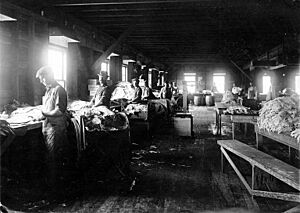
In the 1950s, oil companies built large refineries near Anacortes. Today, two of Washington's five oil refineries are located here. One is run by Marathon Petroleum, and the other by HollyFrontier. Oil refining is still the biggest industry. However, Anacortes also has yacht building, shipbuilding, and tourism.
Fun Things to Do in Anacortes
Anacortes is a popular spot for people who love boating. It's also a gateway for those traveling to the San Juan Islands.
- Washington Park: The city has a large park called "Washington Park." It covers 220 acres (0.89 square kilometers) on the northwest side of Fidalgo Island. Here you can go camping, launch a boat, and enjoy amazing views of the San Juan Islands. You can clearly see Cypress Island from here.
- Whale Watching: Anacortes is close to the Strait of Juan de Fuca. This area is great for whale watching. The waters around Anacortes and Fidalgo Island are home to many types of sea life. This includes three groups of Orca whales that live there.
- Anacortes Community Forest Lands: These lands cover 2,800 acres (11.33 square kilometers). They have 50 miles (80 kilometers) of trails for mountain biking and hiking. This is a special feature for a city the size of Anacortes.
- Mount Erie Park: In nearby Mount Erie Park, you can find many rock climbing routes. These are popular on the cliffs of Mount Erie. From its 1,273-foot (388-meter) peak, Mount Erie offers beautiful views.
- Cycling: Anacortes is also a starting point for many long-distance cyclists. It is the western end of the Adventure Cycling Association's Northern Tier bicycle route. This route goes all the way across the country to Bar Harbor, Maine.
Anacortes Festivals and Events
Anacortes hosts many fun events throughout the year.
- Shipwreck Day: This is a big flea market and town garage sale. It happens every year on the third Saturday in July. The city closes off several downtown streets for the event.
- What the Heck Fest: This was an annual festival that used to happen around Shipwreck Day. It started in 2001 and ended in 2019. The festival featured music, movies, literature, and art at different places in Anacortes. A special part of the festival was a dinner show with a full meal and a concert.
- Anacortes Arts Festival: This festival takes place on the first weekend of August. It started in 1962. Downtown streets are closed off for the event. Vendors, merchants, and artists sell their goods in booths. Jazz and blues musicians perform on four different stages.
- Oyster Run: This is a large one-day motorcycle rally. It happens on the fourth Sunday of September. The event began in 1981 and has become the biggest rally in the Pacific Northwest. About 15,000 motorcycles attend each year, and the number keeps growing.
- Anacortes Farmers Market: The farmers market started in 1989. It happens every Saturday from May to October. There is also a special holiday market before Thanksgiving and monthly winter markets from January to April.
Famous People from Anacortes
Many interesting people have connections to Anacortes:
- Eddie Roberts – A boxer, actor, and sailor.
- Jake Anderson – A fisherman and TV star from the show Deadliest Catch.
- Michael Arrington – An entrepreneur and blogger who started TechCrunch.
- Richard Bach – A well-known writer.
- Craig Bartlett – An animator.
- Duane Berentson – An educator, businessman, and politician.
- Karl Blau – An indie rock and folk musician.
- Phil Elverum – An independent musician.
- Donald Hume – An Olympic rower who won a gold medal in the 1936 Berlin Olympics.
- Burl Ives – A famous folk singer, author, and actor.
- Rien Long – A former NFL defensive lineman.
- The Lonely Forest – An indie rock band.
- William Cameron McCool – A NASA astronaut and pilot of the Space Shuttle Columbia.
- Kathi McDonald – A blues and rock singer.
- James K. Okubo – A recipient of the Medal of Honor.
- Charley Schanz – A former Major League Baseball pitcher.
- Harry Everett Smith – A music expert and experimental filmmaker.
- Lowell Wakefield – The founder of Wakefield Seafoods.
Sister Cities
Anacortes has several sister cities around the world:
Images for kids
See also
 In Spanish: Anacortes (Washington) para niños
In Spanish: Anacortes (Washington) para niños
 | Sharif Bey |
 | Hale Woodruff |
 | Richmond Barthé |
 | Purvis Young |



